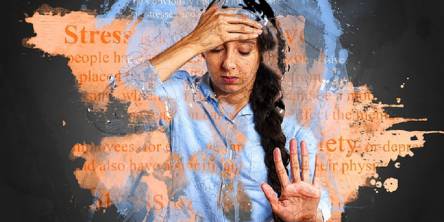The Most Common Types of Mental Health Issues and Related Illness
Mental illness is a common concern we hear every day. 3 out of every 5 people are suffering from a mental illness or distress causing difficulty. Thus, it is essential to be fully aware of the common types of mental health issues and related illnesses.
Mental illness is a general problem that affects a person's mental health. Accompanied by thoughts, perceptions, behaviors, and feelings. The continuous impact of mental illness also damages the personal as well as professional relationships of the sufferer.
Medication, counseling, and meditation are some of the common solutions to treat mental health problems. However, you should be aware of the different types of issues that can affect your mental well-being.
Let us take a closer look at some of the most common mental health issues and illnesses.
1. Anxiety:
The most common mental illness that you must have heard or talked about is anxiety. People struggling with anxiety may have to deal with –
- Anxiety disorders
- Panic disorders
- Social phobias, including some specific phobias
- Post-traumatic stress, and
- Obsessive-compulsive disorder (OCD)
It is important to treat anxiety and all its related issues with the help of counselors for anxiety at the earliest outset. If it is not treated properly, it may cause significant damage to the daily lifestyle of the person.
2. Behavioral and Emotional disorders:
It has been observed that behavioral and emotional disorders usually happen in growing children. This includes –
- Oppositional Defiant Disorder
- Conduct disorder
- Attention deficit hyperactivity disorder
If remain untreated, these can have a very damaging impact on the mental health of children.
Some of the common solutions that can be tried to treat common disorders are as follows –
- Therapy sessions (try using personal therapy sessions as it will help your child to open up more easily)
- Education (give enough information and details to make them aware of the situation)
- Medication (get in touch with an expert to get proper medication)
3. Post-traumatic stress disorder:
This is a common trait in people who have dealt with traumatic events in the past. It is a mental health condition that develops as a response to a single or multiple traumatic event (s).
The symptoms of such mental illness can be expressed differently from person to person, depending upon the traumatic event they have experienced but do have common features. An aspect of the common approach for PTSDare therapy sessions that can help change and manage the person's behavior, feelings, and attitude in relation to relevant triggers.
It is best to start the therapy sessions as soon as a mental health issue is detected. Delaying the treatment will enable a fostering of mental health problems.
4. Depression:
Most of us have heard about depression, but are we really aware of what it actually is.
The common symptoms of depression are –
- Lowering of mood
- Loss of interest, enjoyment, and joy
- Low energy
In simple words, depression can be categorized as feeling sad without any reason. Also, there can be different symptoms and expressions of depression depending upon the person's mental health.
The mental health experts suggest visiting the best therapist for a reliable treatment of depression. If depression is not treated correctly and at the right time, it can cause higher risks of having suicidal thoughts.
5. Psychosis:
If you face symptoms like hallucinations, delusions, and confused thoughts/thinking, there is a chance that you’re of struggling from psychosis. This problem may/may relate to problems such as:
- Mood disorders
- Schizophrenia
Continuous and proper medication, therapy sessions, and psychological support are common solutions that can be tried when fighting against psychosis.
Conclusion:
For any mental illness, disorders, or issues, the only reliable solution is to visit the best therapist for therapy and counseling sessions. The journey may be difficult, but the result will be soothing and beneficial.
Don't waste time and get in touch with market experts like Seekapsych for getting the best help possible. For any other help, please write to us in the comment section. Your mental health is our priority, and we would love to assist you to experience an improvement in mental health and through that experience a more meaningful and thus fulfilling life.
Similar Articles
Anxiety is a normal part of life. It's the outcome of being overworked. However, worry caused by stress is not always a bad thing. It warns you of danger, pushes you to stay organized and ready, and aids in risk assessment.
Anxiety is a normal human emotion that everyone experiences from time to time. It is often characterized by feelings of unease, worry, fear, or apprehension about upcoming events or uncertain situations. Anxiety becomes a concern when it is excessive, persistent, and interferes with daily life.
Anxiety is a widespread mental health problem that affects many people all over the world. It is characterized by worry, tension, and fear, which can interfere with normal life. While anxiety is reasonable in some situations, severe and chronic anxiety can be exhausting and require professional support.
With the COVID pandemic entering its second year, many of us have to cope with the ongoing stress of anxiety, depression, fear, and many other issues.
For far too long, society has been putting pressure on us to avoid most of our emotions. Out of the five core emotions - fear, hurt, anger, sadness, and joy - the emphasis tends to be on the last one.
Anxiety is a feeling of worry or fear. We are all aware of this feeling, and depending on what is causing the anxiety, it can be mild or severe. However, when anxiety becomes long-lasting and one is unable to get rid of it, it can impact a person’s daily functioning.
Are you in a problem with anxiety? This is the article where you will learn how to more effective your anxiety treatment.
For both the patient and the caregivers, the condition of dementia is a burden, which comes with many limitations and problems. In order to make the course of the disease nevertheless as pleasant and helpful as possible, you can use various tips and tricks in dementia care, which make it easier to deal with the patient.
Your brain holds the reins of your courage by creating or accepting societal suitability rules 'au fait'. You only see what you are 'programmed' to see. Weakened ability to see means that your assessment skills critically slump and destroy your image of the world. With this realization, easy and accessible self-improvement techniques are at your arm's lengths


76f4.jpg)






